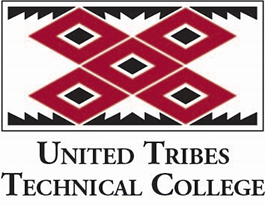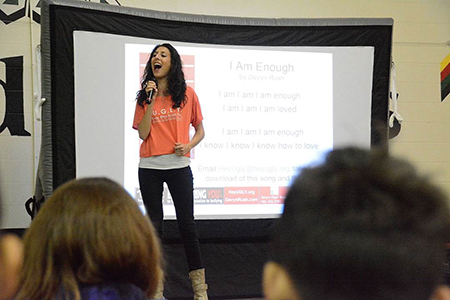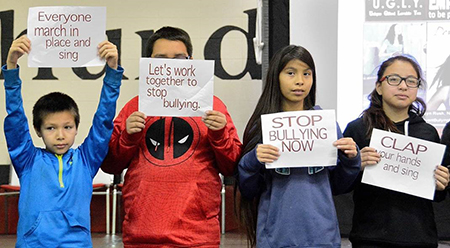For discussion
November 2015
Bullying- Just a Schoolyard Problem? Think Again!

Lynette Schaff is the Director of Student Health at the United Tribes Technical College (UTTC) in Bismarck, ND. She joined UTTC about 4 years ago. Lynette has been a nurse for 24 years and along with her husband, Monte, raise three children, Kylie-15, Amy-14, and Everett-10 years old. She loves being a mother and a nurse. Lynette has witnessed bullying both directly and indirectly and has seen how bullying impacts people throughout the community. She understands how the stress of bullying can negatively affect our health as well. She believes that the more people get involved to prevent bullying, the better and healthier the community will be.
October was National Bullying Prevention month, a time to educate and raise awareness about how to prevent bullying. Bullying is unwanted, aggressive behavior among school aged children that involves a real or perceived power imbalance. The behavior is repeated, or has the potential to be repeated, over time. Kids who are bullied and those who bully others may have serious, lasting problems. Bullying includes actions such as making threats, spreading rumors, physical or verbal attacks and exclusion from a group on purpose. Behaviors that are traditionally considered bullying among school-aged youth often require new attention and strategies in young adults and college students. Hazing, harassment, and stalking are considered crimes under state and federal law and may trigger serious consequences after the age of 18 (stopbullying.gov).
Local communities try to raise awareness about the issue. Bismarck Mayor Mike Seminary proclaimed October 2015 as Bullying Prevention Month in the city and took part in a two-day conference focused on bullying prevention hosted on the campus of United Tribes Technical College (UTTC) in Bismarck.
To improve understanding about bullying prevention, ND Compass talked with conference coordinator Lynette Schaff, BSN, Student Health Center Director in the Lewis Goodhouse Wellness Center at UTTC. The October 1-2 event, titled “Stop Bullying and Youth Suicide,” was part of the Diversity University Series sponsored by the Bismarck Human Relations Committee, Bismarck State College, United Tribes Technical College, and University of Mary.
First, how did the bullying prevention conference event go?
Overall we had a good turnout. It was open to the community and many people came. Our speaker was Devyn Rush, a singer-songwriter who was on the TV program “American Idol.” She represents the national bullying prevention organization “Hey U.G.L.Y.” She was fabulous and an amazing speaker. She reinforced some of what we know about bullying. For example, that many surveys have been conducted and a great deal of data has been collected on the topic of why people bully. The top two reasons that came back on every survey are always the same: Either 1) the person has been bullied before, at school, at home, or somewhere else, and then has turned around and repeated that behavior, or 2) the person is jealous and thinks that someone has more or is better than he or she is.

Photo by United Tribes News, Dennis J. Neumann
Devyn Rush speaker at the UTTC bullying prevention events
Is bullying an issue at UTTC?
I think bullying is an issue everywhere. Here at United Tribes we have a diverse community. We have a wide range of age groups. We have pre-school, daycare, kindergarten through eighth grade school, in addition to our college students. We have a large Native population that comes from various geographic areas, in addition to non-Natives, people from other countries, and people from the LGBT (Lesbian, Gay, Bisexual, and Transgendered) community. The culture is so diverse that the potential for bullying is something we pay attention to. Our outlook is that people who bully have experienced bullying at some point in their life and they tend to carry it with them. This is why we are working to raise awareness that the behavior is unacceptable, that we will address it when it occurs, and that we can do certain things to help those are associated with it.

Photo by United Tribes News, Dennis J. Neumann
Theodore Jamerson Elementary School students greeting Devyn with a music program
What are some of the things you specifically do to combat bullying?
United Tribes places a strong emphasis on leadership. We have speakers come in regularly, usually when classes start, to talk about healthy versus unhealthy leadership and relationships. We focus on improving leadership as a whole and avoiding negative behaviors and tactics in our relationships with others. Leadership is something discussed a lot. We are surrounded by good people and our goal is to bring out the best in our staff and students, so they can be the good leaders we know they are.
Bullying prevention is regularly covered by teachers in the younger grades and speakers visit there too. In addition, we send out follow-ups and reminders. One of the benefits of having speakers is that they reinforce using resources like helplines, where you can leave anonymous tips if you have been bullied or witness bullying. Sharing resources and information is an effort to try to make people mindful of how to safely combat bullying without becoming attacked again.
We also have a retention coordinator on campus. In addition to making sure we retain students, she is instrumental at working with bullying and providing support. We try to educate, give alternatives, and get people to think about things in a completely different way -- “put yourself in their shoes” type of mentality. When thinking about bullies, we see them as these horrible, mean people, but many of them are not. Many have stories, which make you have compassion for them instead. This changes the dynamic of the situation. Hurt people hurt people.
From your perspective, what would be of most help in bullying prevention?
Get involved! Many people don’t realize that bullying is happening all around us. Bullying isn’t just in schools. It’s thriving throughout the community. Bullying is a topic people don’t like to talk about. I think some people think if it doesn’t affect them directly and it isn’t important. But it’s so very important! If it doesn’t affect you directly, it affects somebody close to you. It impacts so many people. Bullying isn’t exclusive to schools and school-aged youth. What people have a hard time realizing is that bullying carries on throughout life. As adults, the workplace can still host a variety of bullying or harassment issues.
As more people become aware, get involved and participate in the conversation, the increased awareness can lead to the development of policies, programs and training that combat this devastating issue--bullying. Remember this is a community issue. We need more than the city and the schools involved, we need everybody in the community to get on board. Bullying and its consequences impact countless people in one way, shape, or form. Bullying is really a community issue and needs to be put to a stop! Join the movement!
Interested in information and resources?
If you are interested in more information and resources regarding bullying and/or suicide please visit or call some of the following resources:
StopBullying.gov: http://www.stopbullying.gov/what-is-bullying/
Stomp Out Bullying: http://www.stompoutbullying.org/
PACER’s National Bullying Prevention Center: http://www.pacer.org/bullying/
National Suicide Prevention Hotline: https://suicidepreventionlifeline.org/; 1-800-273-TALK (8255)
The Trevor Project (specializing in services for LGBTQ youth):http://www.thetrevorproject.org/; 1-866-488-7386
